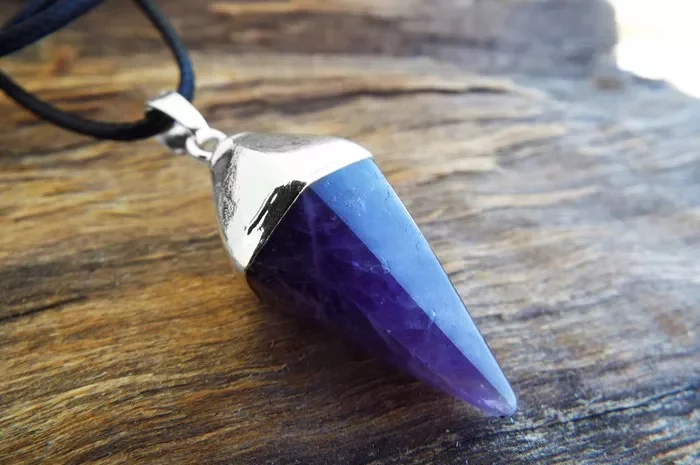Amethyst, a stunning purple variety of quartz, has captivated people for centuries with its beauty and alleged metaphysical properties. From ancient civilizations to modern-day enthusiasts, this gemstone is cherished not only for its aesthetic appeal but also for the perceived benefits it brings to its wearer. A common question among amethyst owners is: “Can I shower with my amethyst necklace?” This article delves into the scientific and practical aspects of this question, offering a well-reasoned answer that balances both the durability of the stone and the care it requires.
Understanding Amethyst: Composition and Properties
Chemical Composition and Structure
Amethyst is a crystalline form of quartz, specifically a silicon dioxide (SiO₂) mineral. Its distinctive purple hue is due to the presence of iron impurities and exposure to natural radiation over millions of years. The gemstone ranks 7 on the Mohs scale of hardness, indicating a fair level of scratch resistance but not invulnerability.
Physical Properties
Hardness: As mentioned, amethyst scores 7 on the Mohs scale, making it relatively hard but not as tough as diamonds (which score a 10).
Durability: Amethyst is durable enough for everyday wear but can chip or crack if struck hard or dropped.
Sensitivity to Heat and Chemicals: High temperatures and harsh chemicals can damage amethyst, affecting its color and structural integrity.
Showering with Amethyst: The Factors to Consider
Water Exposure
Pure water, in general, does not harm amethyst. However, frequent exposure to water, especially tap water, which may contain chlorine and other chemicals, can gradually affect the stone and the metal setting of the necklace. Water can also accumulate behind the stone, causing moisture build-up that might lead to discoloration or degradation over time.
Soap and Shampoo
The soap, shampoo, and other personal care products used in the shower can leave residues on amethyst. These substances often contain chemicals that can dull the stone’s surface or build up over time, requiring more intensive cleaning to restore the gemstone’s natural luster.
Temperature Changes
Amethyst is relatively stable under normal conditions, but sudden temperature changes can stress the stone. Showering often involves exposure to warm or hot water, which might not immediately harm amethyst but can potentially lead to thermal shock if the stone is suddenly cooled.
Metal Settings
The metal setting holding the amethyst is another critical factor. Metals like silver, gold, and platinum can tarnish or degrade with constant exposure to water and soap. Over time, this can weaken the prongs or setting, risking the loss of the gemstone.
Practical Recommendations for Showering with Amethyst
Occasional Exposure vs. Frequent Exposure
Occasional Exposure: If you accidentally wear your amethyst necklace in the shower once in a while, it is unlikely to cause significant harm. However, it is advisable to rinse it with clean water afterward and dry it thoroughly.
Frequent Exposure: Regular showering with an amethyst necklace is not recommended. The cumulative effect of water, soap, and temperature changes can lead to gradual deterioration.
Protective Measures
Remove Before Showering: The simplest and most effective way to protect your amethyst necklace is to remove it before showering. This practice ensures the gemstone and its setting remain pristine for a longer period.
Cleaning and Maintenance: Regularly clean your amethyst necklace with a soft cloth and mild soapy water. Avoid harsh chemicals and ultrasonic cleaners that might damage the stone.
Storage: Store your necklace in a dry, cool place when not in use. A fabric-lined jewelry box or pouch can protect it from dust and physical damage.
The Metaphysical Perspective
Amethyst’s Spiritual Significance
Beyond its physical properties, amethyst is highly regarded in the metaphysical community. It is believed to promote calmness, clarity, and spiritual growth. Some people wear amethyst jewelry to harness these benefits continuously.
Showering with Amethyst: Spiritual View
From a metaphysical standpoint, water is considered a purifying element. Some believe that showering with amethyst can cleanse the stone energetically, enhancing its spiritual properties. However, this view is subjective and should be balanced with the practical considerations of caring for the physical gemstone.
See Also: How to Wear Amethyst Stone Properly
FAQs
1. Can amethyst lose its color over time?
Yes, prolonged exposure to sunlight and harsh chemicals can cause amethyst to fade. To preserve its color, avoid exposing it to direct sunlight for extended periods and remove it before using harsh cleaning products.
2. How should I clean my amethyst necklace?
Use a soft cloth, mild soapy water, and a gentle brush to clean your amethyst necklace. Avoid ultrasonic cleaners and harsh chemicals, as they can damage the stone.
3. Is it safe to wear amethyst every day?
Yes, amethyst is durable enough for everyday wear. However, it’s essential to care for it properly and avoid exposing it to harsh conditions to maintain its beauty and integrity.
4. Can I wear my amethyst necklace while swimming?
No, it is not advisable to wear amethyst jewelry while swimming. Chlorine in swimming pools and salt in seawater can damage the stone and its setting.
5. Does amethyst require special storage?
Store your amethyst necklace in a cool, dry place, preferably in a fabric-lined jewelry box or pouch. This will protect it from dust, moisture, and physical damage.
By understanding the properties of amethyst and adopting proper care practices, you can enjoy the stunning beauty and benefits of your amethyst necklace while ensuring it remains in excellent condition.
Conclusion
Amethyst is a beautiful and relatively durable gemstone that can be a cherished part of your jewelry collection. While occasional exposure to water is unlikely to cause significant damage, regular showering with your amethyst necklace is not advisable due to the potential cumulative effects of water, soap, and temperature fluctuations.
For those who value both the aesthetic and metaphysical properties of amethyst, removing the necklace before showering and following proper cleaning and maintenance routines will ensure the longevity and brilliance of this stunning gemstone. By balancing these considerations, you can enjoy the beauty and benefits of your amethyst necklace for years to come.


